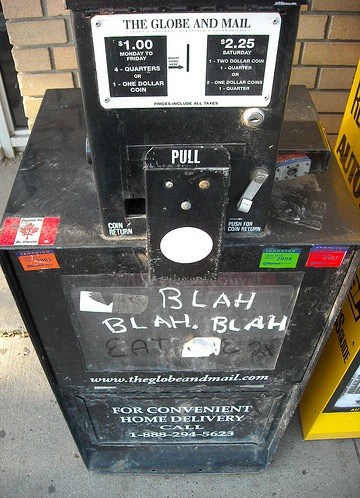I keep hearing people ask about the Globe and Mail. It’s been going on since well before it put up a paywall this month. People get that. Newspapers are in a panic over funding in the Internet era (as they were before it, about TV, and probably radio, though this time’s definitely worse). Their questions are more like: What’s with the Globe? Who does it think it is? What’s it trying to be?
They ask this with special trepidation since the Globe, unlike other papers, always had a quasi-public, quasi-official aura, a bit like the banks. Everyone knows they’re private and for-profit but when you walk in, they still feel somehow . . . civic, with larger duties and responsibilities. Maybe it’s because they’re our source for common currency. In the Globe’s case I don’t know what lends it that aura — perhaps it’s the font.
They aren’t asking about the Globe’s overall politics. It’s clearly a conservative, business-oriented paper with some progressive social views. But that’s common, it’s now the norm for nearly all papers, indicated by the fact that every Canadian daily except The Star and Le Devoir in Quebec, editorially endorsed the Harper Tories at the last election. A paper also has a tone, and that’s what puzzles them. In the Globe’s case, it’s a curiously querulous one.
Last weekend I was glancing through its Life section, where I think the answer lurks. The front page head for “The Twitter Critic” promoting reviews of three arts shows in 140 characters each, ended: “(It’s not glib, we promise.)” The important stuff always happens in parentheses, the way academics hide their truest thoughts in footnotes. This one betrays a sense of insecure readers. I mean, who cares if it’s glib? Or needs a promise it isn’t? Why — in case someone sees you reading and thinks you’re shallow?
It implies readers who want to feel superior and in the know, yet simultaneously fear that, perhaps because of their privilege, they’re missing what’s really going on out there on the mean streets. It’s a tone that reinforces anxiety and simultaneously tries to assuage it, partly through a pervasive, coercive use of “we”and “us” (“Are we raising a cohort of self-conscious narcissists?”) always vigilantly distinguishing us from “them.” This is a journalistic horse that Toronto Life has beaten for decades.
Another place one finds that tone is in the Globe series “Our Time to Lead,” about weighty matters like privatizing health care or shaking up the universities. It’s different because of the cocky assumption that a paper has the right to lead. If I were the Globe’s editor (Go ahead, chortle, get it out of your system) it would be “Our Time to Contribute” — that’s all. But contrast the Globe’s parental model, the New York Times. The Times never needs to assert its right to lead, that’s taken for granted, it just goes ahead and declares what’s what. Nor does it try to induce readers to join in by saying “our time.” Times readers will jump aboard the truth train if they choose. Here, though, we still have elements of a colonial mentality, so aspiring/actual elites may need some coddling and reassurance about their importance that isn’t necessary in the metropole.
Just to compare, the equivalent journalistic tic in the Star would be “The Star Gets Action,” which is feisty and self-congratulatory but not intellectually or socially superior. The Star loves getting action. (This week it got some for a Chinese family whose late mother’s ID went missing in Ottawa.) The Globe’s thing is to lead. Interesting difference. True, you may be able to get some action if you lead, but you may not need to because you’re already up there calling the shots.
I gave some thought to whether it would be inelegant to speculate about the Globe here since I used to write there. But I don’t think I’ve said anything I wouldn’t have written in it, about it, during the years I wrote for it. An ambiguous mix of arrogance, self-doubt, insecurity and superiority is what currently characterizes it, and that’s my best shot. If they want to disambiguate slightly, they could start by changing “Our Time to Lead” to “Our Time to Charge.”
Photo: dawn paley/Flickr
This article was first published in the Toronto Star.




